Урок англійської мови у 10 класі "Meet Great Britain"
Topic: COUNTRY AND ITS LAND
Objectives:
Practical: To systematize students' knowledge about the geography of the UK;
Educational: to activate their vocabulary on the topic; to deepen students' knowledge on the topic; to stimulate them to know more about cultures and traditions of the United Kingdom.
Developing: to master and improve students' language skills of listening, reading and speaking using various forms of work; to develop thinking, imagination and creativity.
Upbringing: to develop students` socio-cultural competence and respect for the British traditions and culture.
Equipment: the map of the United Kingdom of Great Britain and Northern Ireland; the flag; pictures with sights, cards with exercises to the texts; outline maps, a computer, a film ”Window on Great Britain”.
I. Introduction of the topic
Good morning, dear friends. I am happy to see you. Let`s give a warm welcome to our guests. I think a warm smile will encourage our work and you will be energetic, active and supportive at our lesson.
T: To begin with I want you to read the poem, to find and underline all nouns in it.
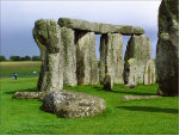 So many countries all over the world,
So many countries all over the world,
So many people life-tales told!
Different cities, languages, poems,
Amazing traditions, legends, stories.
We travel East, we travel West
To know so much is best,
If South is warm, North is cold,
We start our trip and off we go!
T: What is the key-word? (A trip) Why?
T: Today we are going to have a trip to Great Britain. I think this poem can be a motto to our whole course ”The British Country Study” because really we'll speak about different countries, cities, languages and traditions. You know the UK is not a single country. It's ”A country of countries” Millions of people from all over the world visit the UK every year because it is really a very beautiful country. Our task today is to find out if it is worth visiting. Do all your best to have a wonderful trip.
The theme of the lesson “Country and its Land”
First we are going to review general characteristics of the country, its geography and climate.
II. Warming-up
T: Be so kind to imagine that you are on the way to Great Britain. What things or places come into your mind? Tell us about your associations with this country.
P1: Cambridge and Oxford appear before my eyes. You know that the UK’s excellent university reputation. It is my dream to study there.
P2: As for me I see London and its sights. I want to enjoy the high life of London full of historical past. 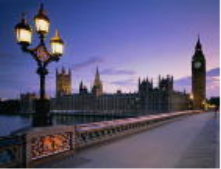
P3: When I think about Great Britain I imagine old-fashioned villages and cottages. I always prefer villages to big cities. I like the beauty of quiet British countryside.
P4: A Royal family appears in my mind. I think it`s a real symbol of Britain.
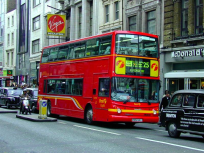 P5: Speaking about Britain I always imagine myself on a football match of well-known Chelsea, Manchester United or Liverpool. I like sports and Britain is really a sporting country.
P5: Speaking about Britain I always imagine myself on a football match of well-known Chelsea, Manchester United or Liverpool. I like sports and Britain is really a sporting country.
P6: Double-deckers. They are a distinguishing feature of London.
P7: I see different castles. I think general look of Britain is surprisingly traditional and I like it.
III. Listening comprehension
T: As far as I've understood you are all greatly interested in this country. And maybe one day you'll have an opportunity to visit Great Britain. Maybe some of you will study or work there. And a good knowledge of English language will be of great help for you in future.
Now we'll watch a short film “Introduction to Britain”. While watching a film I want you to match the parts of the given sentences.
Introduction to Britain
2. Match the parts of the sentences:
- Contemporary Britain is ... A)... the place that is changing all the time.
- It still has ... B)... a growing multi-ethnic and multi-cultural
society developing in many fields: the arts,
architecture, science, education, finance, and
politics.
- People still eat... C) ...pretty villages with old-fashioned pubs.
- And there are still... D)... a mixture of the traditional and the new.
-
At the same time it is ... E).. .a Royal family.

- Britain is ... F)... fish and chips.
IV. Speaking
T: Contemporary Britain is the place that is changing all the time. But still it is a mixture of the traditional and the new. And when you come to this country for the first time it is difficult to understand their style of life. The first problem is the names of the parts of the country. Very often foreigners say “England” and “English” when they mean “Britain” or the UK, or “British”. This is very annoying for the people who live in Scotland, Wales or Northern Ireland. So what is the difference between these names? Two pupils will try to explain it. Be very attentive.
Dialogue
- Hi! Where are you from?
-
Scotland. Are you Scottish too?
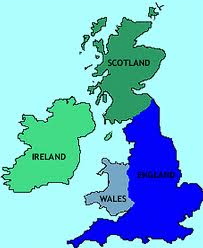
- Oh, no, I am English.
- Actually I think it's the same, isn't it?
- Not exactly.
- Isn't Scotland a part of England?
- No it is not.
- Sorry a part of Britain.
- Britain is not England.
- Well, I am not stupid. The UK is England, Scotland and Wales, isn`t it?
- Not exactly.
- The United Kingdom is England, Scotland, Wales and Northern Ireland.
- I see. Is it the same nation?
- Not really. Four nations and one state.
- Well. The UK is the same like Great Britain.
- Great Britain is the geographical term. It`s a big island with England, Scotland, Wales and Northern Ireland on it.
- All right It`s so complicated. The UK, England, Great Britain.
T: Thank you. It is really not easy. But I think. You won`t mix these terms any more. Look at the map once more and answer my questions:
- 1. What is the official name of the country?
- 2. How many parts are there?
- 3. What is Great Britain?
T: Your home-task was to prepare information about the geography and climate of the UK using the map of the country. You worked in two groups. First we are going to listen to the first one.
P1: If we look at the map we'll see that the U.K of Great Britain and Northern Ireland is an island state. It occupies the territory of the British Isles and is composed of more than 5,000 islands, small and large. The two main islands are GB and Ireland. The UK consists of four parts: England, Scotland, Wales and Northern Ireland.
The UK is washed by the Atlantic Ocean in the north-west and the North Sea in the east. The English Channel and the Strait of Dover in the south separate the UK from Europe. Two islands (GB and Ireland) are separated by the Irish Sea.
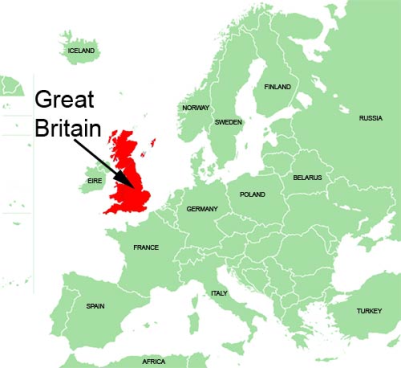
P2: The UK is one of the world's smallest countries and has the territory of more than 200,000 sq. km. The population of the country is 57 million people.
The landscape varies from the north to the south. The highest mountains are found in Scotland (Ben Nevis) and Wales (Snowdon). There are no long rivers (the longest are the Severn and Thames). But the country has many beautiful lakes especially in the Lake District and Scotland.
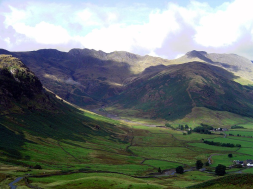 The largest cities of the UK are London (the capital city), Birmingham, Liverpool, Manchester, Bristol, Glasgow and some others.
The largest cities of the UK are London (the capital city), Birmingham, Liverpool, Manchester, Bristol, Glasgow and some others.
P3: The country is not very rich in mineral resources. The leading mineral resource of Britain is coal and coal-mining is one of the most important British industries. The major industries include iron and steel; engineering, textiles and chemicals. Over three-quarters of Britain's land are used for farming.
P4: The nature of the British Isles is picturesque. There are many rivers and very beautiful lakes, but no great forests in the British Isles. The mountains are not very high, but very beautiful. The most picturesque part of the country is Highlands in the North of Scotland. This is a region of mountains and rivers, small towns and villages. In Wales there are also many beautiful mountains and valleys. Everyone who comes to England says that it looks like one great beautiful park. The Englishmen love their country and take care of it. 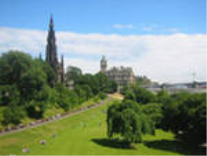
V. Writing.
T: Britain attracts a lot of tourists.
They want to visit every corner of this beautiful
country. There are many places in Great Britain which once visited will always be remembered. Let`s watch one more episode of the film and be ready to characterise the capitals of the UK.
The UK
England, Scotland, Wales and Northern Ireland make up the United Kingdom of Great Britain and Northern Ireland. People usually refer to it as the UK or simply Britain. With the population of 59 million Britain has the third largest population in Europe. Belfast is the capital city of Northern Ireland. It grew since the 19th century during Britain's industrial revolution. It's a city of grand buildings and interesting monuments. Cardiff is the capital city of Wales. It is a modem city that takes pride of its historic traditions. The capital of Scotland Edinburgh is on the same latitude as Moscow. It's a beautiful city which is rich in history. London, the capital city of Britain, has a population of nearly 7.250 million (seven and a quarter million) which makes it the largest city of Europe.
T: Complete some sentences about capitals:
1. Belfast is the capital city of Northern Ireland.
2. It grew up in the 19th century during Britain's industrial revolution.
3. It's a city of grand buildings and interesting monuments.
4. Cardiff is the capital city of Wales.
5. It is a modern city with historic traditions.
6. Edinburgh is the capital of Scotland.
7.It is on the same latitude as Moscow.
8. It's rich in history.
9. London is the capital city of Britain.
10. It has a population of nearly 7.250 million
11. It is the largest city of Europe.
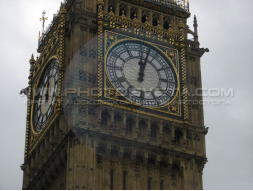
V. Geographical Dictation
T. I hope everybody has revised the geographical material and has listened to the information properly. Now, prepare for the dictation with the outline maps. Mark the geographical location of the following places:
The Atlantic Ocean
Northern Ireland and Belfast 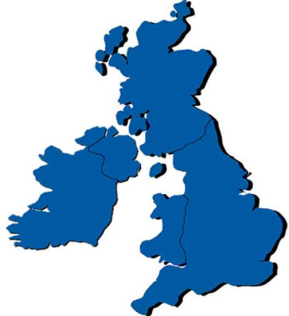
Scotland, Edinburgh
Wales, Cardiff
England, London
the Irish Sea
the North Sea
The English Channel
VI. Watching
Pre-watching task
T: Geographically Great Britain is an island but nowadays we can hear that Britain is not an island any more, because it is connected with the continent by the tunnel.
Britain was an island
A long time ago, Britain was joined to France. Then about 8,000 years ago, the level of the sea rose and Britain became an island. The result was the channel. The French had ideas for a tunnel between France and England as early as 1802, but the Englishmen did not show much interest. 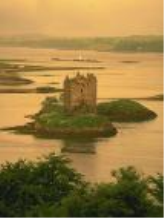 The sea kept foreigners out — including friendly ones like Napoleon! You can cross the Channel by plane, ferry, hydrofoil, catamaran and by hovercraft. Now there is another way by tunnel.
The sea kept foreigners out — including friendly ones like Napoleon! You can cross the Channel by plane, ferry, hydrofoil, catamaran and by hovercraft. Now there is another way by tunnel.
Britain is not an island any more. The Eurochannel Tunnel opened in 1994. There are two tunnels for trains and one service tunnel for repairs and emergencies. The Channel tunnel is 50 km long, it is 130 m under the sea. Journey time in the Tunnel is 21 minutes. Now, the journey from London to Paris takes only three hours. About 20 million people use the tunnel yearly.
T: Now we have an opportunity to see this tunnel. While watching fill in the gaps with the appropriate numbers: 50, 60, 1994, 1973.
Travel
Britain has been politically joined to Europe since it joined the European Union in
----. And it has been physically joined to the continent since ---- by the
Channel Tunnel. Just over---- kilometers long the Channel Tunnel takes passengers
from Waterloo Station in London to Paris, Brussels, and Lill. Britain is a major centre of international travel. Heathrow is the busiest international airport with over----million passengers a year. Other major airports around London are Gatwick and Stansted which are important for the budget airlines. And London, like so much of Britain, is always on the move.
T: One more interesting fact is that geographical position can have an influence on the character of people. They say that the British love of compromise is the result of the country’s physical geography. This may or may not be true, but it certainly true that the land and climate in Great Britain have a notable lack of extremes. The mountains in the country are not very high. It isn’t very cold in winter or very hot in summer.
Now it`s high time to speak about climate.
P1: Great Britain is situated on islands. It is washed by seas from all sides. That’s why the climate and the nature of Great Britain is very specific. The English people say that they have three kinds of weather: when it rains in the morning, when it rains in the afternoon or when it rains all day long. It often rains so heavily that people say “It’s raining cats and dogs”. Besides Britain is famous for its fogs. Sometimes fogs
are so thick that it is impossible to see anything within 2 or 3 metres.
P2: The climate of Great Britain explains much about British. Everybody knows the proverb: "When two Englishmen meet, their first talk is about the weather". The weather in the country is so changeable that the English people say they have no climate but only weather. The climate is damp and mild, because of the Irish Sea; the winter is not very cold and the summer is not very hot. All parts of the British Isles get a lot of rain in all seasons. That's why umbrella is carried even if it doesn't rain. But the changeability of weather made the English patient. The following rhyme proves it:
Whether the weather is fine, 
Or whether the weather is not,
Whether the weather is cold,
Or whether the weather is hot
Whether the weather,
Whatever the weather,
Whether we like it or not.
T: The British climate is considered to have a bad reputation. Maybe because the weather changes very often. It can change 3 or more times a day or maybe that British people always seem to be talking about the weather. Everybody knows the proverb: “When two Englishmen meet their first talk is about weather” Now we`ll listen to 'Weather Talk' which will prove that English people really like to speak about the weather.
'Weather Talk'
George: Isn't it marvelous to take a walk in Hyde Park on such a beautiful day, Leon?
Leon: It is. These parks are really the lungs of London. By the way, I'm a bit tired. There's a nice bench. 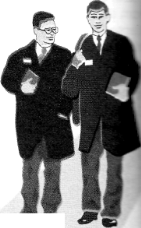
George: You mean the girl on that bench is nice. She's rather good-looking!
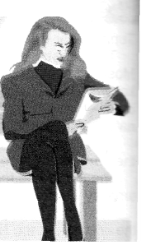 Leon: Not rather good-looking, but very beautiful. How do you start a conversation with a girl?
Leon: Not rather good-looking, but very beautiful. How do you start a conversation with a girl?
George: It's better to start with the weather. That's always a safe subject.
Leon: Let's try.
Leon: Lovely day today, isn't it?
Girl: It is.
Leon: It seems a glorious day.
Girl: I think we are in for a fine spell..
George: I hope it will last. There's hardly a cloud in the sky.
Leon: There's hardly a breath of air.
Girl: By the way, I've just read the weather-forecast in my newspaper here.
George: What does it say?
Girl: (reading) There will be occasional rain or drizzle, but bright weather with a few scattered showers will spread to England and Wales.
Leon: I fear a thunderstorm is coming.
Girl: It looks like rain. It's beginning to rain.
Leon: And we have forgotten our umbrellas
George: It never rains but it pours!
Girl: Fortunately, I've got my umbrella with me. Let me put it up.
Leon: But the English have a saying about the weather:
If you don't like it now, just wait a bit.
George: Look! It's clearing up. The clouds are lifting.
Girl: It has stopped raining. Look at this wonderful rainbow!
Leon: Bright sunshine again. Now I know why English weather is something worth talking about.
T: You see my dears that the topic “weather” can even help people to get acquainted, that is why English weather is worth talking about.
VII. Summing up. Quiz: "Do you know much about Great Britain?"
T: And now let`s sum up our knowledge about the UK. Your task is to answer the questions of the quiz: "Do you know much about Great Britain?"
- What's the highest mountain in Great Britain? — Ben Nevis in Scotland.
- What river is the longest in Great Britain? — The Severn.
- What is Liverpool famous for? — The Beatles band.
- What's the birthplace of William Shakespeare? — Stratford-upon-Avon.
- In what part of GB is the wool industry developed? — Scotland.
- What's the translation of the Scottish word "loch"? — Lake.
- What's considered to be the English national game? — Cricket in summer, football in winter.
- What cities are University cities in GB? — Oxford, Cambridge.
- How old are British-Ukrainian relations? — Volodymyr Monomah was married to a daughter of King Harold.
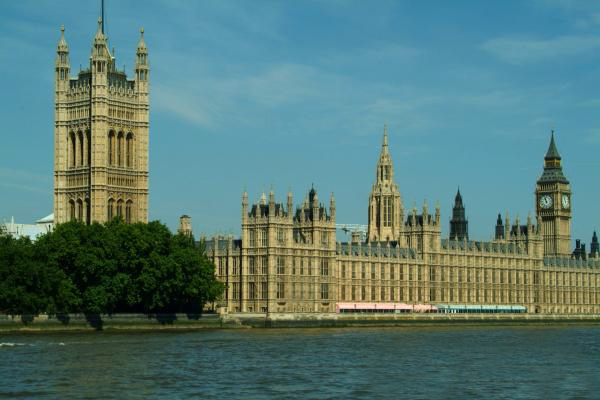


про публікацію авторської розробки
Додати розробку
